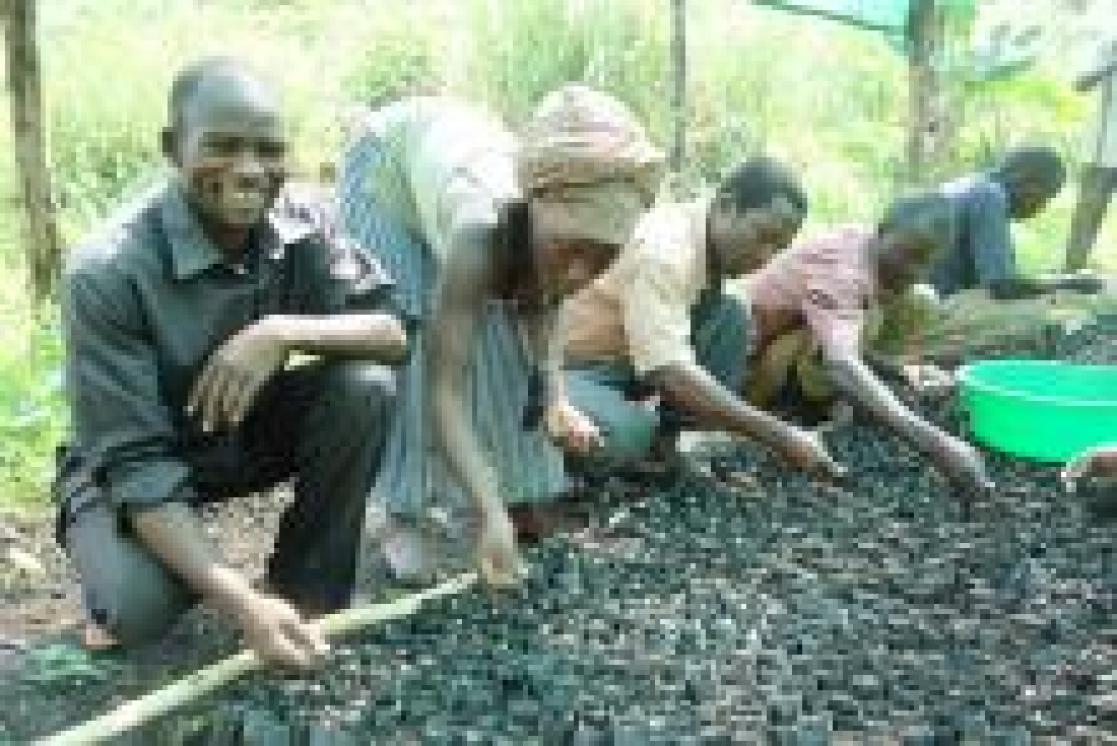Sustainable financing of the Rwenzori Mountains National Park (RMNP) Uganda

Total Cost (EUR): 1 699 283.69
EU contracted amount (EUR): 1 359 427.00
Duration: November 2013 May 2017
Implementing organisation: WWF - WORLD WIDE FUND FOR NATURE
Funding Instrument: DCI - Environment and sustainable management of natural resources including energy
Benefitting zone: Uganda
STORY: Improving lives while conserving nature in the Rwenzori Mountains, western Uganda
Coffee farmers learn about climate-smart agriculture and preserving ecosystems

"Through this project, the community members have been put at the forefront of conservation. We want them to appreciate the value of the ecosystem and realise how they can benefit from it sustainably. The financing mechanisms that are being put in place will improve household incomes and livelihoods and as a result reduce pressure on the park resources."
Koli Augustine, Senior Environmental Officer, Kasese District Local Government
CONTEXT
Rwenzori Mountains is a biodiversity hotspot with a variety of landscapes and species providing essential ecosystem services such as carbon storage, forests and water catchment. But high population growth in the region has a direct impact on the park and its periphery, leading to erosion, watershed degradation and sedimentation of rivers. The project seeks to conserve the biodiversity and support livelihood improvement among communities through sustainable financing mechanisms. It also seeks to improve the way communities use natural resources by demonstrating a long-term sustainable approach.
OBJECTIVES
- Overall objective: Biodiversity and ecosystem services of Rwenzori Mountains National Park (RMNP) and of the buffer zone are secured and contributing significantly to local livelihoods by 2020.
- Specific objective: By 2017, the adoption and strengthening of sustainable financing mechanisms ensure the long-term financial stability of the RMNP, for the conservation of its ecosystem and biodiversity and increasing benefits to local communities.
RESULTS
- Rallying the participation of the private sector in order to support sustainable funding instruments for biodiversity conservation, and generating additional income for both the Rwenzori Mountains National Park and the local communities, while reducing pressure on natural resources.
- Working with the National Environment Management Authority (NEMA) to develop a national regulatory and institutional framework for Payment for Ecosystem Services (PES) in Uganda. Existing legal and tax provisions are being reviewed and will be taken to educate the public decision-makers on PES schemes. Clauses promoting PES will be written into the new national environmental act.
- Establishing long-term funding sources for RMNP and local communities through a pilot scheme to reward landowners with payment for improving land management practices for improved water catchment. 911 landowners from 14 Water User Groups (WUGs) have been trained in the implementation of catchment management interventions, tree planting, siltation and sediment management, soil and water conservation, marking and vegetating the riparian land and woodlot establishment.
- Increasing tourist numbers and revenue to the RMNP and introducing a diverse range of products through community-based tourism initiatives. Uganda Tourist Board has come on board to provide technical support in tourism product development and marketing. A feasibility study for tourism potential was carried out and tourism products for development have been recommended to promote tourism in the region.
TESTIMONY
Matthias Kasighalire, Marketing Manager for Busongora Joint Farmers’ Association (BJFA)

Busongora Joint Farmers Association is a coffee-growing, community-based organisation composed of farmers from communities neighbouring the Rwenzori Mountains National Park in Kasese District.
In the organisation, we have 516 coffee farmers. Our dream has always been to produce the best coffee in the district. [Project implementer] WWF has provided funding to support our efforts in improving our coffee yield quality and quantity and also diversify our product. Through this support we have learned good agricultural practices such as digging trenches, planting shade trees, mulching which have dramatically reduced runoffs in the gardens that were affected by soil erosion and many of our members who have adopted these practices expect better yields in the coming seasons.
We are currently setting up a demonstration garden to teach other members of the community the same. We have also established a coffee nursery bed from which we will supply our members with seedlings and also get incomes from the sales. Several families have also set up small vegetable gardens for their families to improve nutrition.
A visit to Mount Elgon was organised by WWF for us to learn about good agricultural practices. We learnt about value addition and how to diversify into tourism in order to increase revenues. We currently can provide a coffee experience to a client with our coffee from roasting to a cup of coffee on site. This has been a major boost in our work so far.
FACTS AND FIGURES
- Community-Based Tourism (CBT) assessment for all CBTs around RMNP, 3 selected for grants to support their activities. Training provided in business management, accounting and record-keeping.
- 75 000 seedlings distributed to farmers, 51 hectares planted, woodlot established in 2014 season; 911 farmers trained in group governance, catchment management and Payments for Ecosystems Services.
- Two studies (hydrological and agronomic study and economic study) carried out, and a socio-economic study underway.
- 10 members of Kyanjuki Handcraft Women’s Association trained to improve product quality; 6 members of Kinyampanika Chimpanzee Conservation and Development Association trained in chimpanzee monitoring, survey and habituation in Kibale Forest Park.
PARTNERS
